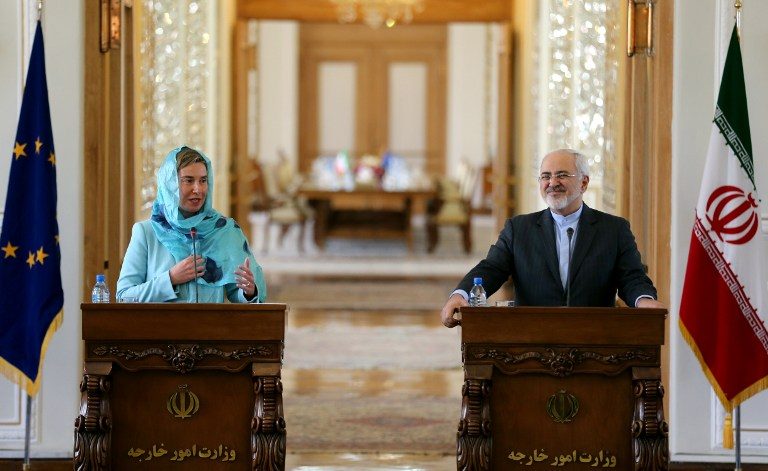SUMMARY
This is AI generated summarization, which may have errors. For context, always refer to the full article.

TEHRAN, Iran (UPDATED) – The European Union’s top diplomat during a visit to Tehran on Saturday, April 16, admitted difficulties in implementing Iran’s recent nuclear deal with world powers, but maintained that the agreement was on track.
Federica Mogherini’s comments, in a joint press conference with Iran’s Foreign Minister Mohammad Javad Zarif, underscored tension in Tehran over the accord, which has been in force for 3 months.
Under the deal, all nuclear-related sanctions were lifted but Iranian officials have accused the West, particularly the United States, of failing to honour its side of the bargain.
Among their grievances is the contention that US government officials are scaring off European banks from investing in Iran for fear of falling foul of regulations that saw massive fines imposed in recent years.
Mogherini, on her first trip to Iran since the nuclear deal came into force in January, said the diplomatic gains of the agreement must now be turned into “benefits in Iranians’ daily lives.”
But Zarif echoed remarks from other Iranian officials about the deal not producing discernible benefits.
“It is necessary that the other side’s cooperation, especially the United States, is made good in practice, not only on paper,” Zarif said, alluding to Seif’s comments.
“We warned the US and we will put some pressure on them, to pave the way for cooperation between non-US banks and the Islamic Republic of Iran.”
Mogherini sought to play down concern, saying that three months of “challenges” on the deal’s implementation was nothing compared to the 12 years of diplomacy it had taken to produce the nuclear agreement.
“We obviously have not finished the work on implementing the JCPOA,” Mogherini said, referring to the nuclear deal by its official name, the Joint Comprehensive Plan of Action, describing it as “an ongoing task”.
‘Doing all that we can’
Put to her by a reporter that the banking issues were obstacles, Mogherini countered: “There are challenges in implementation, it is true.”
She cited 50 pages of guidelines that have been issued to European financial institutions that detail how business can now be conducted with Iran.
“We are doing all that we can to reassure our financial and banking system that all the new information on the new system is provided.”
Mogherini pointed to other evidence of cooperation, saying the EU has agreed to support Iran’s bid to join the World Trade Organization (WTO) for example, and Iran will take part on a joint dialogue on human rights.
But Mogherini also raised with Zarif the EU’s concern about recent ballistic missile tests by the elite Revolutionary Guards, which a UN panel said breached Security Council resolutions.
She said the EU did not regard the missile tests as a breach of the nuclear deal.
“We see this as a worrying step. Any step that could pass different messages (other than cooperation) is not welcome.”
Mogherini, who personally helped negotiate the nuclear deal between Iran and Britain, China, France, Russia and the US plus Germany, was accompanied by other top EU officials.
The six powers led by the United States agreed in July last year to lift sanctions that had locked down much of the Iran’s economy for years in exchange for limits on Tehran’s nuclear programme.
The move allowed Iran to resume a higher level of oil exports when the deal was implemented, as well as opening up more trade opportunities.
But with the US still maintaining some sanctions, including on what it says is Iran’s sponsorship of designated terror organisations, Iran’s access to global finance remains limited.
Mogherini said the conflicts in Syria and Yemen, where the West has been looking for Iran’s cooperation with peace efforts, as well as Iran-EU cooperation on energy production and technology were also discussed. – Arthur MacMillan, AFP/Rappler.com
Add a comment
How does this make you feel?
There are no comments yet. Add your comment to start the conversation.